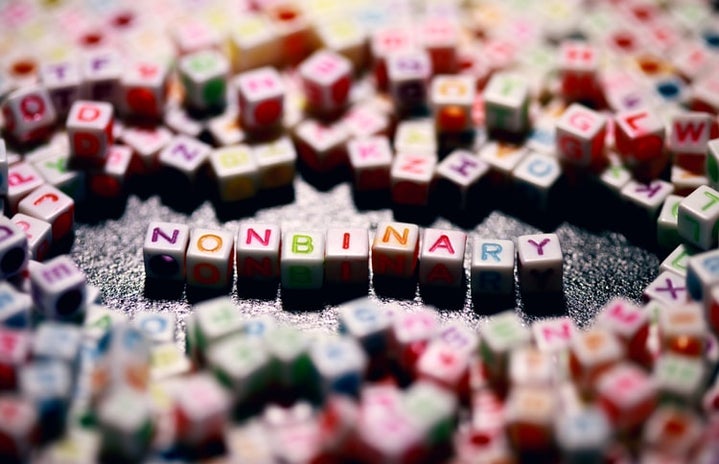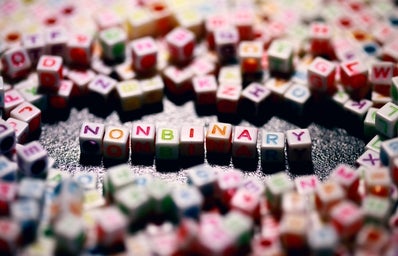Recently Demi Lovato came out as a non-binary person and opened a whole new debate that has been kept in silence for a while. Who are the non-binaries and why do they use neutral or different pronouns?
- Understanding non-binary
-
We have cis and trans people when talking about genders, and most of society doesn’t know non-binaries are a part of trans people. Cis people are the ones who identify with the sex they were born and imposed meanwhile trans are those who don’t recognize as the enforced one – they may relate to the opposite or to none(non-binaries).
To explain more about the term, we talked with Pedro Paulo Camargo who explains what they understand about being non-binary: “Is completely different for each person, there is no limitation of what it is, but for me it is existing outside the boundaries of gender, which is considered feminine and masculine, there is a space outside these two spaces”.
They says that people still have a pretty misguided view of non-binary, they don’t want to recognize the community. Most assume it means not being androgen – someone who likes to act not according to characteristic ways or to dress with clothes society judge as made for the opposite sex. Society thinks it’s just not wanting to be called a man or a woman but it is beyond, they don’t understand that it’s an identity, it’s a gender, it exists and it has always existed. There is no recognition, most people do not accept that it is a gender identity, do not believe it exists. Within Brazil itself we have difficulty putting our identity in documents. This is solved with education and debate over the years
- Incorporating into everyday life
-
We need to disassociate gender and sex, or else we’ll never have a respectful and inclusive community. Associating both invalidates a person’s identity, doing this Pedro Paulo and many others could never exist in freedom and understanding themself. In the process of including minorities like them in our day to day it is important to use neutral pronouns. In English we have they/them and in Portuguese the most common ones are elu/delu and ile/dile, it is not hard or impossible to incorporate them into our vocabulary, it is a little bit more difficult in the latter but not that complex.
We don’t have genders for adjectives, in English, although many of them are already indirectly targeted to female or male people. For example: They is pretty, we used a neutral pronoun but the adjective “pretty” is mostly directed to women, so if the person is non-binary maybe they will feel uncomfortable, so it is important to ask wich adjectives are better. In Portuguese we have to change the pronoun and normally the last letter in the adjective, for example: Elu/Ile é bonite.
You haven’t changed the formal structure, just a few letters that create an unimaginably larger inclusion. It’s not that hard. People have the idea that grammar and language can never change, which makes them strongly refuse their use, even though the language is changing every day, we add new words, expressions and slang often. Why not do this to make people feel more included?
Pedro gets out of them to chest them disappointment: “I don’t see why we don’t add the neutral pronoun, I see it less as a struggle for grammatical rules and more for transphobia. They want to deny our existence, concealing this by the debate of the sanctioning of cultured language”.
- The place in LGBTQIA+ community
-
Unexpectedly inside the LGBTQIA+ movement non-binary people are also discredited. Transbedicalists, (trans people who believes you are required to be a man or a woman) don’t believe in their existence, as said being non-binary is a trans identity, but sometimes trans people don’t want to accept that. When opening the debate outside trans walls comes the question about attraction, Pedro said that some use it as an excuse like “oh, non-binary is not a part of whom I’m attracted by”, they do not want to open their heads, think outside the box. They says it’s hard to be non-binary within the community, but it’s much easier than outside it. In the exterior of the LGBTQIA+ community there is a lot of prejudice, when people refuse to understand you they enter a point where they do not want to believe and then invalidate you, think we’re doing it for attention, unfortunately we still do not have a place where we are completely accepted.
In the path of being 100% inclusive, is also demanded from people to acknowledge that make-up, clothes, shoes and many other accessories and characteristics are not related to sex, they are gender-free.
- How was your discovery process?
-
If you still don’t understand very well about non-binary people, Pedro still gives his account of the process of not identifying with either of the two imposed genders. Who knows, maybe it clarifies better?
“My identification process came from a discomfort, I was placed as a man since I was born, over a long time, even after discovering that I was gay, by my 15 years I began to get very uncomfortable to be related and associated with a man, but also did not feel good being related to woman. When I found out there was another space, it became very clear that it was my identity. I didn’t feel comfortable in any of the roles I knew and when I found out that there was this other place, it was a complete release, to recognize myself and realize that I was valid and that I could be renowned”.
Most people who are not okay with the imposed role wish they had known more about the other sides of society, such as sexual orientation, gender, affirmation and identity. That is why it is so important to open the debate even when kids, in schools and inside our house, so that maybe in the future the next generations can be themselves without passing through trauma, discouragement and sometimes fear.
- Demi Lovato and Them Importance
-
Demi coming out as a non-binary person is huge, not only for the cause but for all the LGBTQIA+ community. They are an enormous prestigious star and can reach millions of people, bringing not only attention but knowledge about our existence. It was an amazing step towards recognition, and their followers will find a way to know more, search and therefore be more inclusive, since their idol is a member of an oppressed community. We know that there are people who did not like her announcement and maybe stopped following and worshipping them but even so without their work it wouldn’t be possible to reach others who don’t know this group exists. We have other artists who are non-binary and we need to give them our support, so let’s remember to check Sam Smith’s, Tommy Dorman’s, Du Blonde, Indya Moore’s, Bárbara Paz’s, Sara Ramirez’s, and many others’s work.
In short, non-binary is not a third gender, it can describe individuals that identify as nothing related to female or male, be in between, beyond or something totally different from the spectrum we know. Not all non-binaries relates to the trans community or likes to be described as transgender. Non-binary can also be written as nonbinary, or shortened as “enby” or “nb”, but the last is not used often because it can means non-black too. There isn’t a limit on being, each individual has its characteristics, choosing any type of expression, keep in mind to ask what is more comfortable. Some people use neopronouns such as XE/XIM or ZE/HIR, they can also go by SHE/HER or HE/HIM, it’s actually up to the person, as said before those are individual decisions. Some may go by medical procedures to fit better in their own bodies but it does not make them less or more non-binary, they’re just living their truth.
————————————————————–
The article above was edited by Nicoly Bastos.
Like this type of article? Check Her Campus Casper Libero for more.


